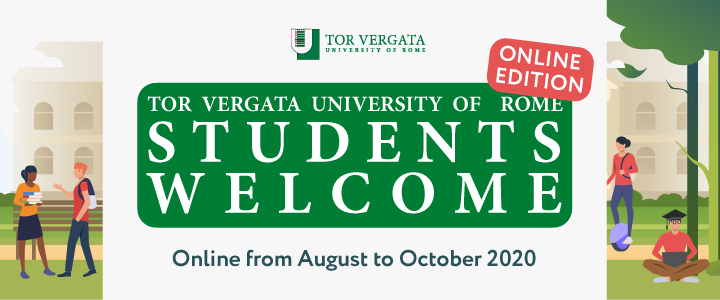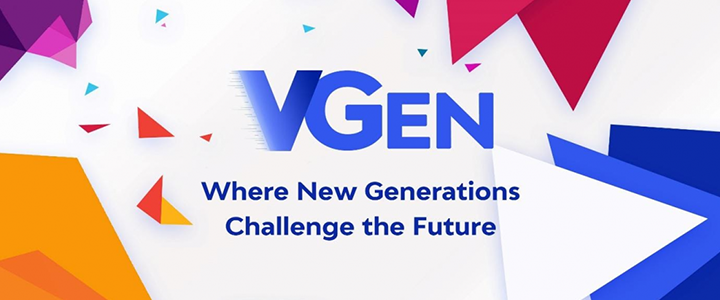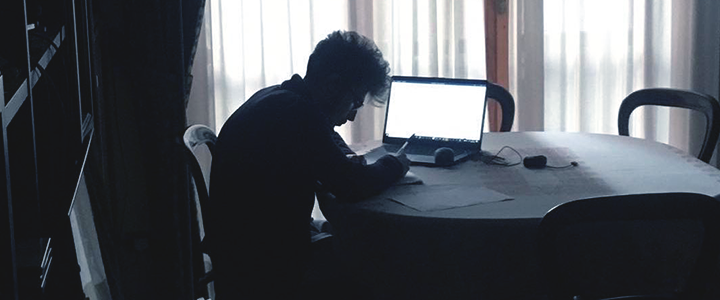To access the university premises a self-declaration form has to be filled.
Please download here: ? SELF-DECLARATION FORM
Latest News from the Faculty of Pharmacy of Rome Tor Vergata.

To access the university premises a self-declaration form has to be filled.
Please download here: ? SELF-DECLARATION FORM

The General ranking for the 80 admissions to the Degree Course in Pharmacy for Italian citizens, communitary citizens, and non-communitary citizens legally residing in Italy are available.
Eligible candidates who do not enrol within the deadlines described will be regarded as renouncers.
Even after obtaining a valid score, candidates are excluded in the following cases:
1) non-EU citizens residing abroad who did not submit the pre-enrollment application form on the universitaly platform before taking the test;
2) non-EU citizens having declared their residence / domicile in Italy who did not attach a valid residence permit when registering for the test.
Also excluded are those who have not obtained a minimum score of 18/50 or have taken the test in Italian (TOLC-F) and not the ENGLISH TOLC-F in English as required by the call.

If you are a new international student, the Welcome Office is here to help you.
Also this year Tor Vergata University of Rome will be glad to welcome all of our newly enrolled students to the Students Welcome Weeks 2020.
Enrollment support meetings:
When: Starting from 5 August, 2020
What: if you have finalized the procedure on Universitaly platform, the Welcome Office will contact you by email and help you through the enrollment process or offer support if you’re having difficulties
Where: Microsoft teams (you will receive by email a link for the online meeting)
Welcome online:
When: Starting from 26 August, 2020
What: each week the Welcome Office will organize online meetings dedicated to welcome and orientation activities for all the new students enrolled at Tor Vergata University.
International students already in Italy will be supported and tutored in filling the Stay Permit, Health Insurance and Pass card for transportation in Rome modules.
Where: Microsoft teams (you will receive by email a link for the online meeting)
Students Welcome Events:
Presentation of activities and organizations available at the campus of #unitorvergata or in the city of Rome.
When: Starting from 26 August, 2020, presentation of our services in English:
Where: youtube channel unitovergata, playlist “Students Welcome 2020” – facebook unitorvergataContacts:
welcome@uniroma2.it

CLICI (Center for Italian Language and Culture) organizes Extensive Courses in Italian Language and Culture for Tor Vergata foreign students.
For more info on CLICI read here.
Registration from July till September 2020
For further information, follow the live event with the Director’s of CLICI, prof. Florinda Nardi.
Event Info
When: Wednesday, July 8, 4 p.m
Where: Tor Vergata’s Social media pages
Facebook @unitorvergata
YouTube @unitorvergata
Contacts: welcome@uniroma2.it

Question: When is the dateline to do the pre-enrolment (form A) in UNIVERSITALY?
Answer: The pre-enrolment MUST be done at least one week before the online test. For example, If a candidate has the TOLC-F@HOME on the 24th July, the pre-enrolment should be done within the 17th July. The same for the students that are planning to take the exam on these dates: 8, 13, 15,20,22,27 and 29th July.
Be aware that the final procedure for the visa MUST be concluded in the Embassy of Italy that will issue the student visa within 30th November.
Question: What documents do I need to upload in UNIVERSITALY.
Answer: There is a list of documents to choose from; you have to select what you already have and upload them.

The regulations relating to payments to the Public Administration oblige public administrations, including Universities, to receive relevant payments through the system called PagoPA promoted by the Agency for Digital Italy (AGID) of the Presidency of the Council of Ministers (www.governo.it).
PagoPA is an electronic payment system designed to make any payment to the Public Administration easier, safer and more transparent. PagoPA payment can be carried out through various channels (credit card, at bank branches, tobacco stores, etc.).
Payment Notification
Student will receive a payment notification at the end of the normal immatriculation / enrollment / subsequent installments / competitions / access tests.
The PagoPA notice contains the Payment Notice Code, the QR Code and the Interbank Code (CBILL circuit) that allow you to pay easily.
PagoPa allows you to make the payment through a plurality of channels, physical or online.
Payment Methods
Once the PagoPA notice has been obtained, it is possible to pay with different methods: online with a credit card by connecting to the site http://utov.it/pagopa via PAgoPA’s APP IO if you have SPID credentials via home / mobile banking through CBILL circuit or members of the PagoPA system at all bank branches or ATMs that allow you to pay through the CBILL circuit or members of the PagoPA system in Sisal / Lottomatica ticket offices it is not possible to pay the PagoPA bulletin at the Poste Italiane counters
PagoPA Guide
Attached is a special guide (in Italian and English).

VGen is a community of young talents, who propose ideas and solutions for social and technological innovation. Born in Tor Vergata in 2018 is now well-established in Italy, counting several HUBs and more than 300 under 30 talents as members.
Through challenges and events, VGen aims to connect companies with new generations of students, startups and freelancers. Our strongest belief is the leading and pivotal role of new generations in social and technological change.
A VGen HUB is a Chapter of the VGen community, formed by those students that showed great interest in developing VGen activities inside their own university.
1. VGen HUB Activities
2. JOIN US
Be part of the Value Generation! Do not miss the opportunity to challenge yourself. To discover something more on us visit the VGen website: www.vgen.it
Local President and Referent: Elena Marfori
Email address: elena.marfori@vgen.it
Facebook: facebook.com/v0gen
LinkedIn: linkedin.com/company/vgen

Dear students!
Roskilde University (Denmark) is engaged in the research project “The Social Impact of the coronavirus crisis in 10 Universities”. We would appreciate your participation as Tor Vergata students!
The leading researchers on the project are Anders Ejrnæs and Bjørn Thomassen, both Professor (mso) in Social Sciences and they have requested the supervision for Italy of the anthropologist professor Pietro Vereni.
We are very grateful for your participation – and feel free to encourage your fellow students to participate!
The purpose of the project is simply to examine how the corona crisis has affected our lives. Your information will be collected via the questionnaire you will find a link to here below. We ask you two kinds of questions:
1) questions where you are asked to answer within some predefined categories;
2) some completely open questions that allow you to describe in your own words how you are living through the corona crisis. We believe in the importance of sharing our stories in this crisis situation.
Participation in the project is voluntary. The legal basis for processing your personal data is Article 6 (1) of the Data Protection Regulation and Paragraph 10 (1) of the Data Protection Act.
After collection, the information will be stored securely and without unauthorized access. When stored on portable media, such as computers, phones and hard drives, data will be encrypted to ensure protection.
Tor Vergata and Roskilde University keep your information until the project is completed + 10 years; it will then be transferred to the National Archives.
Data will be used for publication in scientific journals and media outlets. Data will be used in such a way that the readers of these articles will not be able to identify you as a participant – or that you have participated in the project.

On the day of the exam, each professor will proceed to take the attendance of the booked students, in order to check who is actually present, subsequently he will declare the exam open and students are called to take the test in the order deemed appropriate.
It is recommended that other connected students temporarily turn off their device audio and video-cameras in order not to disturb the student who is taking the exam.
The professor will call the first student, explicitly request her/him to activate the camera (in addition to audio) and will verify the identity of the examined candidate by checking and taking note of the identification document details.
Candidates will be recommended to keep their eyes on the screen (in order to avoid the consultation of illegal material, unless the Commission allows it).
Student may not wear hats and must show the ears (to avoid the use of micro-earphones): students are recommended to use headphones with microphone or to speak directly into the devices’ microphone.
The student’s behavior will be closely monitored: For the outcome of the examination, it will be evaluated whether (s)he denotes distraction from the monitor or excessive uncertainty or slow response.
The Commission can decide to inform the student about his final grade or to call the next one. The exam session will not be recorded.

Following the outbreak of the coronavirus, the Overseas Call for International Mobility for study for the A.Y. 2020/21 has been suspended and will open in June.
Mobility will be allowed only in the second semester and will follow the emergency status of the country where the host Institutions are.
All Students are kindly required to check the following link:
Overseas Office
We will send communication about the open of the call and the deadline.
The goal of these grants is to allow students of Tor Vergata University of Rome to study at an extra-European host university (under an Agreement existing between the two Institutions) to carry out didactic activities that must be consistent with their course of study;
Students must attend classes and do the final exams, and will obtain the title (Degree or Master Degree) only after their return and after the conclusion of the mobility period.
For further information please contact the Overseas Office:
Phone +39 06 7259.3509
e-mail: students.exchange@international.uniroma2.it